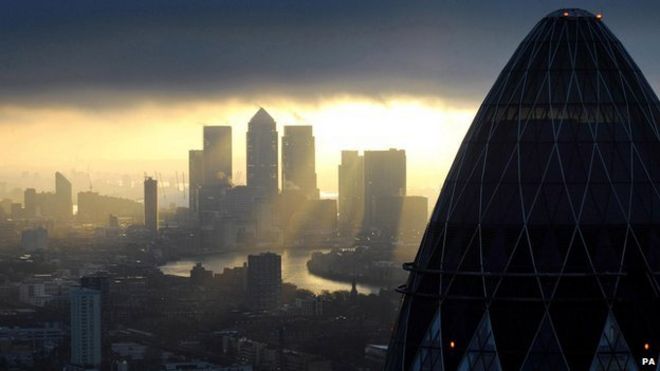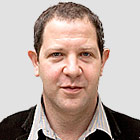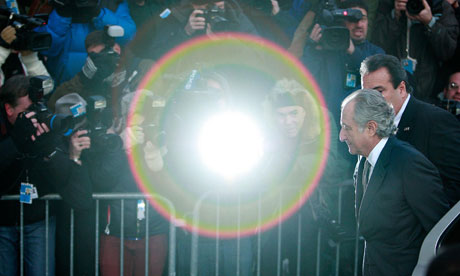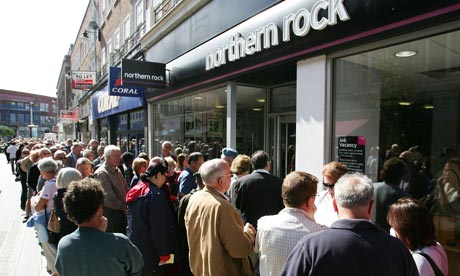When Adam Applegarth was forced out of a sinking
Northern Rock in December 2007, it was amid the kind of numbers that tend to dance in front of your eyes. In the five years running up to the bank's spectacular crash he had been paid around £10m. During the 18 months immediately before he cashed in shares worth £2.6m. On leaving he secured a golden goodbye to be paid in monthly instalments, totalling £760,000. His pension, payable when he turns 55, is worth £304,000 a year.
The year after his exit he was glimpsed in a very familiar setting, once again turning out for the second XI of his beloved Sunderland Cricket Club. "This summer," said one of his old associates, "he will be putting his feet up. He is playing an awful lot of cricket, enjoying his motors and travelling."
In the autumn of 2009 Applegarth became a senior adviser to the American private equity firm Apollo Management, advising a new arm, the European Principal Fund, on the buying-up of distressed debt – perhaps a field of expertise. Three years on he remains in the job and shielded behind a communications firewall administered by a New York PR firm called Rubenstein Associates, whose other clients include Walt Disney, the Las Vegas Comedy Festival, and the American Kennel Club.
When I contacted them, I was handed over to a breathlessly efficient operative called Melissa, who said I should send over my questions. With a view to at least trying to get his attention, I kept them non-confrontational, and short: What does Mr Applegarth's role at Apollo involve? Could he explain how the depth of banks' problems in 2007 first revealed itself to him? And how has his life been since? Twenty-four hours later she called back: "Put us down for a decline to comment," she said.
So, on to another lead. In September 2010 it was reported that Applegarth had joined his son Greg in setting up a company called Beechwood Property Management, in which he held 55 of the 100 shares. Their documents list both men's occupation as "consultant". Their registered office is on the 11th floor of a gleaming Newcastle office block called Cale Cross House, but when I called the in-house security guard he had never heard of them. In fact, this is merely the address of their accountants – who passed on a message, with no result.
There is no entry for Beechwood Property Management in the phone directory, nor has it a website. On the face of it, it is a ghost outfit, whose existence is only noticeable to those hard-bitten people who pore over records held at Companies House.
Such is the great cloud of silence that now surrounds people who were once among the loudest voices in the financial services industry.
The reclusive lifestyle of former Royal Bank of Scotland chief Fred Goodwin barely needs mentioning. Steve Crawshaw, who turned Bradford and Bingley from a staid building society into a specialist in self-certified mortgages and left the company weeks before it had to be nationalised, has apparently retired to the Yorkshire countryside: his only publicly-recorded activity these days is as the chair of the advisory board of the School of Management at Bradford University, who forwarded him my list of questions, but I heard nothing back.
Even the few who still have heavyweight business roles keep schtum: there may be a beautiful poetry in the fact that the former
HBOS chief executive Andy Hornby is now the boss of Coral bookmakers, but getting him to talk is a non-starter. "As the article does not relate to his current role at Coral he wishes to respectfully decline your request," said his spokesman.
At the height of a financialised age, it was the done thing to refer to these people as "Masters Of The Universe". Five years on, picking through the subsequent career histories of those who sparked first the
credit crunch and then the crash, the suggestion of omnipotence sounds absurd. Most of the people at the centre of the events of 2007-8 tend to suggest a much less titanic stereotype: the faded rock star, often still trying to keep their hand in, well aware that the hits have dried up, the old tricks have long since turned embarrassing, and their time has passed.
Meanwhile, a very awkward question sits in the public mind: will there ever be any convincing payback?
In the US, only a tiny handful of former bankers have been criminally indicted on charges relating to the crash: most notably, Ralph Cioffi and Matthew Tannin, two former
Bear Stearns employees – and one-time sub-prime specialists – who were acquitted of fraud and conspiracy in November 2009. In February this year a civil case brought by the Securities and Exchange Commission was settled on the basis of a $1.05m payout from the two, which the judge in charge termed "chump change".
The only big figure sent to jail for his part in two decades of crazed speculation and irresponsibility has been Bernie Madoff. By contrast, the people who bundled up the bad debt in arcane financial instruments that pushed the world to the brink of ruin are still out there: hugely diminished – but free, and hardly penniless.
Even those who steered Lehman Brothers into catastrophe and thus started the decisive crash of 2008 seem to have got away with it. In May this year an internal memo from the SEC leaked to Reuters said that after its investigation into the bank it had been "determined that charges will likely not be recommended".
Which brings us to 780 3rd Avenue in Manhattan, the location of an almost comically dull office block that looks like a giant house brick.
Inside is the HQ of Matrix Advisors. Its founder is a byword for the events of 2007-8: Dick Fuld, the CEO of Lehmans, until its cataclysmic demise. Back then, he was the pumped-up corporate icon once known as "the Gorilla", the man who summed up his business style with the boast that he wanted to reach into the bodies of Lehmans' competitors, "rip out their hearts and eat it in front of them before they die".
These days he apparently flits between New York and his homes in Florida and Sun Valley, Idaho – on bog-standard commercial flights, according to witnesses – looking after a tiny outfit which provides "strategic advice to client management teams and senior employees … across all aspects of business". One source close to Fuld has said that the workforce extends to "a young guy from Lehman and two secretaries". When I called their office, I therefore had the tantalising sense that the figure most indelibly associated with the crash might only be a few yards from the person parrying my questions. Her name was Carla Schiavo: she suggested I send over a few lines of inquiry.
What, I asked, does Mr Fuld's work at Matrix Advisors involve? What are his views on the aftermath of the credit crunch and how banks and regulators have responded? What did the financial services industry need to do to recover its esteem? Eventually, Schiavo pointed me in the direction of Fuld's lawyer, a former president of the New York Bar Association named Patricia Hynes – who, predictably enough, did not deign to reply to either phone calls or emails.
Two months ago Fuld was seen at an ice hockey game between the New Jersey Rangers and the New York Devils. An eyewitness reported on the scene for the Wall Street news and gossip site Dealbreaker: "He was with two goons who were clearly his bodyguards, one sitting next to him in a tan jacket and the other one standing behind him in black. Fuld was wearing a suit … I guess to try and look like he actually has a job he was coming from before the game."
Documents filed with US regulators two years ago said Fuld's work at his new venture stretched to around 60 hours a week. Such hard graft may be a necessity: proof, as with the sale of his Park Avenue apartment three years ago (for $25.87m) that he may not be enjoying quite the life of unending luxury that some would imagine, and setting money aside for future litigation, which has so far been met from the coffers of Lehmans' insurers. There is also an abiding sense of twitchiness. When a reporter doorstepped him three years ago, he blurted out: "You don't have a gun. That's good."
For others who were intimately involved in the crash, there is a similar sense of shrunken lives, and mouths sealed shut. Kathleen Corbet was the president of the hugely important ratings agency Standard & Poors, but quit in August 2007 just as it started to become clear that the safe-as-houses triple-A ratings given to mortgage-backed securities had turned out to be illusory. She is now in charge of Cross Ridge Capital, a small private equity firm based in New Canaan, Connecticut – and did not respond to messages asking for her take on what happened in 2007 onwards, and what has transpired since.
Neither did Maurice "Hank" Greenberg, who pumped up AIG to the point that the American group became the biggest insurance company in the world – only to watch it plunge towards bankruptcy and become 80% nationalised by the US government.
He resigned two years before the start of the crash, in 2005, in the midst of the accounting scandal that began the firm's nosedive – but the fact that he avoided direct involvement in the crash presumably accounts for the fact that in controlled circumstances, he can speak with a belligerence that might suggest the events of 2007-8 never happened.
"We now have huge government, which is not the creator of opportunity – it's the private sector that creates opportunity, so our basic values are under attack," he recently said, warning against the prospect of "regulating ourselves out of business". By way of putting his money where his mouth is, Greenberg is suing the US state for $25bn, alleging that AIG's board was "coerced" into turning over control of the company to the federal government.
Such a high-profile action contrasts with the post-crash story of his old AIG colleague Joseph Cassano – the man who sold credit default swaps in London to keep the money coming in, and thereby pushed the company towards such ruin that it needed £182bn of US taxpayers' money to keep it alive. Back then, Cassano lived in an opulent townhouse behind Harrod's. He has since moved back to Westport, on Long Island Sound, where he is apparently unemployed, and uncontactable.
But if there is one man who remains the best embodiment of all the delusion and absurdity that led to the crash, it is 74-year-old Angelo Mozilo, the son of a Bronx butcher, a man so tanned that his skin looks like an orange dipped in toffee. Until July 2008 he was the chairman and chief executive of Countrywide Financial, the USA's biggest provider of sub-prime mortgages. Between 2001 and 2006 he took home something in the region of $470m.
The company crashed from August 2007 onwards, finally being bought out by the Bank Of America. In a civil case that ended in October 2010 Mozilo settled with the SEC to pay $22.5m to cover allegations of fraud and insider trading, with a further $45m going to his company's former shareholders to cover "ill-gotten gains", to be taken from BoA and Countrywide's insurers.
The SEC's director of enforcement said this: "Mozilo's record penalty is the fitting outcome for a corporate executive who deliberately disregarded his duties to investors by concealing what he saw from inside the executive suite – a looming disaster in which Countrywide was buckling under the weight of increasingly risky mortgage underwriting, mounting defaults and delinquencies, and a deteriorating business model." At the same time, Mozilo was cashing in shares to the tune of $285m.
Last year a criminal investigation into Mozilo's activities was shelved. But the intrigue swirling around him will not go away: four years after stories about his firm's dealings with American lawmakers first appeared in the media, a Congressional Committee has alleged that Mozilo ran a "Friends of Angelo" unit to grant influential members of congress preferential loans, and thereby subdue any drive to rein in his very risky kind of business.
The impact of what Mozilo and his company did cannot be overstated: it was Countrywide that led the drive to drown the international financial system in bad debt, while he was paying himself spectacular amounts of money. In Wall Street, the City and beyond, the result of what he and his colleagues were doing was a deathly panic, and the end of the boom years; in the real world, millions of people had their homes repossessed or lost their jobs and now we labour under the austerity cuts that still grip the Western economies like a vice.
In May this year a piece in the LA Times reported that Mozilo and his wife Phyllis had sold their home in Thousand Oaks, 29 miles west of near LA, for $2.9m. It described a "Georgian Colonial-style two-storey" property, sitting above the second fairway at the Sherwood Country Club, complete with "a cherry-finished library-office, five bedrooms, six bathrooms and an oversized four-car garage", along with "an infinity pool, spa, lawn and a built-in barbecue".
Reading it, you wondered if perhaps, in their own way, the Mozilos were feeling the pinch. And then came the last sentence, and the sickly scent of the high life, uninterrupted: "They hold other southern California properties in trust, in Riverside and Santa Barbara counties."




